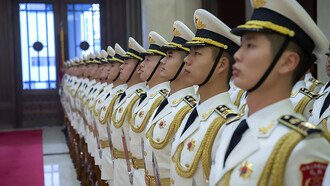In the realm of political power, a single term can wield remarkable influence, transforming public perception and policy. One such term from the Putinism playbook, while seemingly innocuous, is a potent tool for manipulating political narratives and maintaining control. Understanding its impact reveals just how deeply language can influence and shape our political landscape.
Beyond politics
In April 2022, Sergey Chernyshov, the director of Novosibirsk City College, became a rare beacon of resistance against political manipulation in Russia. Chernyshov supported students arrested for anti-war demonstrations, defying police demands for him to engage in "educational work" with them. His assertion that "education is beyond politics" marked a significant moment of defiance. This use of the phrase, typically a shield for avoiding political engagement, stood in stark contrast to its usual function in Russian politics.
The Kremlin frequently uses the term "beyond politics" to suppress dissent and maintain control. For example, after Russia’s full-scale invasion of Ukraine, professional unions, including the Federal Bar Association, circulated anti-war letters. In response, 11 members signed a counter-letter asserting that "advocacy is beyond politics," supporting the invasion. This rhetorical manoeuvre illustrates how the Kremlin manipulates language to reinforce its political agenda.
Similarly, dissatisfaction among Russian doctors about the country's exclusion from international medical organisations was summarised by the sentiment that "medical science should be outside of politics." This insistence on depoliticisation is part of a broader strategy employed by Putin's regime to control various sectors by marginalising political discourse.
A historical perspective
The notion of depoliticisation in Russia isn’t new. The late Soviet era, particularly the 1970s, saw a society that appeared highly politicised from the outside but was actually quite disengaged. The public oaths of allegiance to Communist doctrine during the Age of Immobility were largely ceremonial, with little genuine belief in their sincerity.
The 1990s, marked by political turbulence and reform, saw increased political participation. However, this period also witnessed growing nostalgia for a more stable, apolitical past, which Putin capitalised on when he came to power. He implemented a systematic campaign to depoliticise Russian society, tightening control over media, restricting political activities, and manipulating electoral processes. In other words, in the background of the passive consent of the population, during the years of Putin's rule, the Kremlin carried out a long and consistent program of depoliticisation of the society.
From mobilisation to demobilisation
Putin's strategy has focused on demobilising the public rather than mobilising it. The process reached its climax in the mid-2010s, when the main strategy of the government in various elections became the deliberate reduction of activity. The government tried to draw the public's attention to the elections as little as possible. The principle of this mechanism is simple: those who vote correctly will be brought to the polling stations by the government, and the rest are better not to come to the elections at all. This strategy is evident in the historically low voter turnouts in recent elections—47.8% in 2016 and 51% in 2021, compared to over 65% in the 1995 parliamentary elections.
Sociologist Grigory Yudin highlights that forced depoliticisation is a cornerstone of the Russian regime. By suppressing civil engagement, the government eliminates grassroots initiatives and discourages both opposition and pro-government activism that doesn’t originate from the authorities. The case of Igor Kholmogorov, who was banned from holding a pro-war rally because it wasn’t government-sanctioned, exemplifies this tactic.
The "dirty business" of politics
Putin’s rhetoric often describes politics as a "dirty business," announcing Russia's full-scale invasion of Ukraine. Putin, 'outraged' by the actions of the West and the expansion of NATO to the east, said, "I repeat, we were lied to, in the common language, dumped. Yes, we often hear that politics is a dirty business, but at this level?!"
The same phrase was used by the author of a column published in the fascist publication “Царыград”, which justified the tightening of the law on Russian foreign agents. The view about the dirtiness of political activity is especially widespread in the post-Soviet space.
Variations of this idea can be found among the philosophers of antiquity, but in Russia it was formulated most clearly and consistently by the tutor of Emperor Alexander III and the most influential ideologies of his time, Konstantin Pobedonotsev. He often criticised Western parliamentarism in his 1884 article "The Great Lie of Our Age." He argued that true power in parliamentary systems lies with a few party leaders rather than the majority. Elections, he claimed, favour the most brazen candidates, turning parliamentarism into a tool for personal interests.
Pobedonotsev believed that under elective political systems, ordinary people had no more rights than under autocratic monarchies. He ignored the crucial ability of citizens in democracies to change their rulers, a concept unthinkable in autocracies like Russia.
While democratic systems have flaws and corruption, Pobedonotsev's views have become a collective mantra in Russia, portraying politics as inherently corrupt. This perspective undermines civil society engagement, fostering cynicism and disengagement among the populace. Regimes like modern Russia benefit from this sentiment, as they do not rely on mass public support to maintain power.
Such sentiments are especially beneficial for the government, especially considering that the trust of the Russian population in Putin is even in the worst cases twice the trust in other governmental institutions. In other words, the Russian regime was able not only to instill mass distrust in politics, but also to successfully remove Putin from the equation.
According to a Levada Centre survey in fall 2021, only 25% of Russians trusted the Duma, and 35% trusted the government. Despite these low levels of trust, the regime maintains stability by promoting a public attitude that politics is inherently corrupt. This mindset, while not beneficial for democratic engagement, is advantageous for an authoritarian regime that thrives on public passivity.
The path forward
While political passivity might seem like an escape from the complexities of politics, in authoritarian regimes, it effectively supports the status quo. In democracies, active citizenship is crucial for a healthy political environment. Engaging with the political process, scrutinizing politicians, and participating in debates are essential for preserving democratic values.
The similarity between democratic and totalitarian systems lies in their demand for citizen involvement. However, in democracies, this involvement is voluntary and protected by rights, whereas, in authoritarian regimes, it is often suppressed or manipulated.
To counter the erosion of democratic values and the manipulative tactics of regimes like Putin’s, we must remain vigilant and actively participate in political processes. Recognising and challenging the language used to control narratives is a key step in defending our democratic principles. By staying informed, questioning political rhetoric, and advocating for transparency, we can help ensure that democratic systems remain robust and responsive to the needs of their citizens.
This article was written by Lika Kobeshavidze. Lika is a Georgian political writer, analytical journalist and fellow with Young Voices Europe, specialising in EU policy and regional security in Europe. She is currently based in Lund, Sweden, pursuing advanced studies in European Studies.















